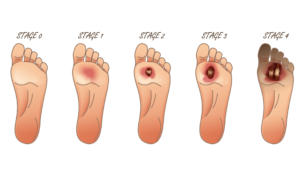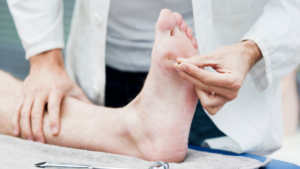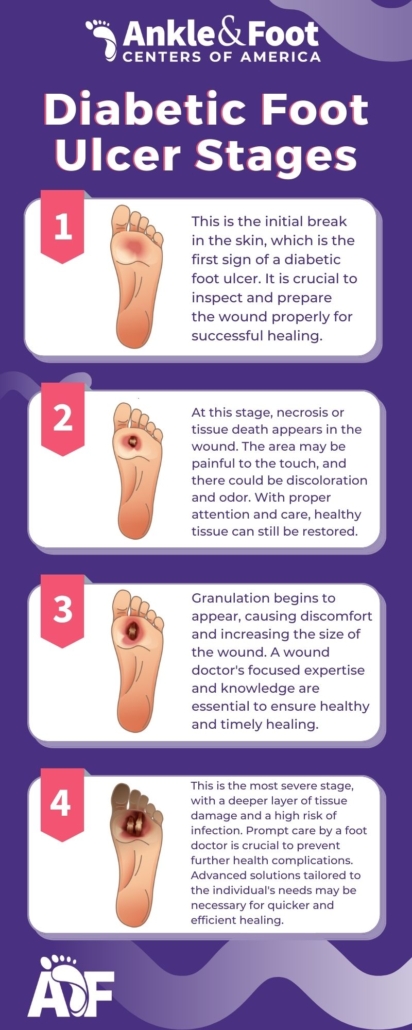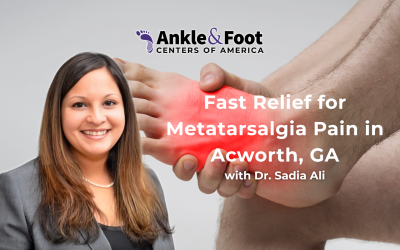Table of Contents
Diabetic Foot Ulcer Stages – Atlanta Wound Care Specialist Explains
 Diabetic foot ulcers can be a major problem for diabetic patients in Atlanta, particularly if left untreated. It is extremely important that diabetics take proper precautions to prevent developing this condition, which can cause severe health issues for them. If you or someone you know is living with diabetes and developing an ulcer on their feet, it’s time to consult a wound care specialist who can explain the different diabetic foot ulcer stages: introducing Dr. Richard Kaufman, an Atlanta Wound Care Specialist and board-certified podiatrist! Today we will discuss the different stages of diabetic foot ulcers and why each stage requires specialized care from skilled professionals!
Diabetic foot ulcers can be a major problem for diabetic patients in Atlanta, particularly if left untreated. It is extremely important that diabetics take proper precautions to prevent developing this condition, which can cause severe health issues for them. If you or someone you know is living with diabetes and developing an ulcer on their feet, it’s time to consult a wound care specialist who can explain the different diabetic foot ulcer stages: introducing Dr. Richard Kaufman, an Atlanta Wound Care Specialist and board-certified podiatrist! Today we will discuss the different stages of diabetic foot ulcers and why each stage requires specialized care from skilled professionals!
Introducing Richard Kaufman, DPM, an Atlanta Wound Care Specialist
Meet Dr. Richard Kaufman, the go-to wound care specialist in Atlanta. Operating out of his office in Roswell, Georgia, Dr. Kaufman brings years of experience and technical know-how when it comes to tackling complicated medical issues like chronic wounds or non-healing sores. Not only is he trained to provide expert wound care treatment, but he also strives to create an environment of comfort and trust for his patients. His commitment to high quality patient-centered treatment makes Dr. Kaufman one of the most sought after Wound Care Specialists in Atlanta, GA.

Overview of Diabetic Foot Ulcers and their Stages
The different diabetic foot ulcer stages are a serious concern for many, especially those suffering from diabetes. These open sores can arise on the feet of those who have difficulty regulating their blood sugar levels, and if not properly managed, can lead to severe complications such as amputation or even death. Left untreated, these sores can worsen and progress through several stages, from an inflamed and painful wound to exposed muscle or bone. Seeking assistance from a specialized healthcare provider like an Atlanta Wound Care specialist can be incredibly beneficial in preventing these ulcers from escalating to a more dangerous level. With proper medical care and support, these wounds can be effectively managed and treated before more severe measures need to be taken.
Early Stage Diabetic Foot Ulcer
 Early stage diabetic foot ulcers are important to identify, as they can rapidly develop into a more serious health issue. If left unchecked, these types of wounds have the potential to become open sores that can lead to infection or even amputation in extreme cases. In order to prevent this, it is important for individuals with diabetes to adjust their lifestyle accordingly and proactively scan their feet for any signs of a wound such as discoloration, redness or tingling sensation. Respecting their own limits while regularly attending professional medical checkups is a crucial step in preventing and treating early stages of diabetes before the disease progresses to dangerous levels.
Early stage diabetic foot ulcers are important to identify, as they can rapidly develop into a more serious health issue. If left unchecked, these types of wounds have the potential to become open sores that can lead to infection or even amputation in extreme cases. In order to prevent this, it is important for individuals with diabetes to adjust their lifestyle accordingly and proactively scan their feet for any signs of a wound such as discoloration, redness or tingling sensation. Respecting their own limits while regularly attending professional medical checkups is a crucial step in preventing and treating early stages of diabetes before the disease progresses to dangerous levels.

Stage 1 Foot Ulcer – The initial break in the skin
When it comes to wound care, the initial break in the skin is a vitally important step. The team of podiatric experts who practice with Dr. Kaufman understand that proper inspection and preparation of Stage 1 diabetic ulcers play a major role in healing success rates. The dedicated team at the Ankle & Foot Centers of America takes a comprehensive approach to diagnosing and evaluating your wound’s severity accuracy, including determining the origin of the injury and identifying any existing infection or inflammation. With these elements considered, a customized plan should be created to ensure your particular wound is managed with best practices.
Stage 2 Ulcer – Necrosis or tissue death appears
Signs of necrosis, or tissue death, in a wound are never welcome news. As a wound care expert, Dr. Kaufman understands the urgency and severity of a stage 2 foot ulcer. Along with the area being painful to the touch, possible discoloration and odor can also be apparent. However, there is still hope to restore healthy tissue at stage two–it is not too late! Through meticulous attention and consistent care, successful treatment of this wound can be achieved. An Atlanta podiatrist will help you get your body back to its best state and back on its feet in no time!
Stage 3 Diabetic Foot Ulcer – Granulation begins to appear and the ulcer increases in size
Stage 3 of a wound can be a difficult time for those who are dealing with it. During this stage, granulation starts to appear, which can cause some discomfort, as well as increasing the size of the ulcer. A wound doctor is essential at this point to ensure that healing progresses in a healthy and timely manner. Dr. Kaufman, a Wound Specialist in Atlanta, GA, provides highly focused expertise and knowledge to ensure your wound is both cared for and treated effectively. The foot doctors at the Ankle & Foot Centers of America know how to make sure you have the best chance of recovery through their assessments and treatments. Do not hesitate to contact these Atlanta Podiatrists if your wound enters Stage 3; they are ready to help you on your path to health.
Stage 4 Ulcer on the Foot – Deeper layer of tissue damage appears and the wound may become infected
Stage 4 diabetic wounds can be severely complicated and should not be taken lightly. If you suffer from a stage a 4 ulcer on your feet, it is important to take quick action and visit a local podiatrist for proper treatment. An infected wound can potentially lead to more serious health problems if left untreated, so prompt care by a foot doctor is essential. Your physician may offer advanced solutions tailored to your individual needs, helping you heal more quickly and efficiently. Whether you’re suffering from a chronic wound or acute injury, there’s no reason to wait any longer before getting the specialized care you need!
When to see a Podiatrist in Atlanta who specializes in Diabetic Foot Ulcers
 If you or a loved one is living with diabetes, having the right podiatry team available can make all the difference. This is especially true when it comes to diabetic foot ulcers, which are unfortunately incredibly common in those with diabetes. That’s why having a knowledgeable podiatrist on hand who specializes in such wounds is especially important – and if you live in Atlanta, you’re in luck. A local wound care specialist has extensive experience treating the diabetic foot ulcer stages, offering comprehensive support and customized treatment plans for every patient. Whether you’re attending follow-up appointments or require specialized surgery, book your appointment with Dr. Kaufman Today!
If you or a loved one is living with diabetes, having the right podiatry team available can make all the difference. This is especially true when it comes to diabetic foot ulcers, which are unfortunately incredibly common in those with diabetes. That’s why having a knowledgeable podiatrist on hand who specializes in such wounds is especially important – and if you live in Atlanta, you’re in luck. A local wound care specialist has extensive experience treating the diabetic foot ulcer stages, offering comprehensive support and customized treatment plans for every patient. Whether you’re attending follow-up appointments or require specialized surgery, book your appointment with Dr. Kaufman Today!





